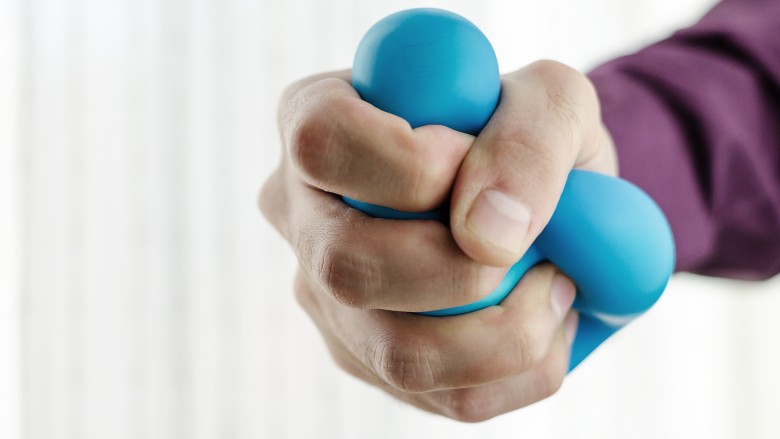Weird Ways To Live Longer According To Science
Life is pretty great, generally speaking, and for the most part, you'd be pressed to find anyone who isn't interested in spending as much time living as possible. And there are a bunch of really obvious things you can do to achieve that, like exercise more, eat less, and drive slower, which is all fine and boring. However, according to science, living longer isn't just about waistlines and calories. Because as you will see, there are also a bunch of weird ways to put more sand in your timer.
Be a nice person
Be nice! It's not just a way to get along with people and make society a better place, but it will help you live longer, according to a report in Time magazine.
In a 20-year study that followed a group of older people between the ages of 70 and 103, those with grandchildren or non-family members in their social group, who they occasionally cared for, lived longer than those who didn't care for anyone. Of the people in the study who didn't care for anyone, half the group died within five years of the start of the study, and the people who cared for someone had the best chance of being alive after 10 years.
However, the positive results only applied to people who were occasional carers. People with full-time care responsibilities experienced greater stress and pressure that negatively affected their life expectancy. So, giving a little of your time to the benefit of someone else is an investment worth making. Just don't be like the Giving Tree and tear yourself apart doing so.
Learn a language
All those language lessons from high school (that you've probably mostly forgotten by now), were good for more than just being able to order a drink when you found yourself confronted by a barman who doesn't speak English. That's because even if you never go to another country and have to speak it, the mere act of learning another language could extend the life of your brain.
According to studies conducted at Toronto's York University, Canada, the University of Edinburgh, UK, and at Nizam's Institute of Medical Sciences in Hyderabad, India, speaking a second language can delay the onset of symptoms of dementia by four or five years. Another study conducted at Penn State University using fMRI scans found that the process of learning a second language helped the brain develop new connections, strengthen existing ones, and create a better integrated brain networks.
So if you want to avoid getting sent to a care home at the end of your life, condemned to hour after hour of nothing but daytime TV and jigsaw puzzles, try learning a new language. That way, instead of not getting visited by your kids as often as you'd like, you can spend an extra half decade not visiting them, because you're too busy traveling the world, seeing sights, and ordering those drinks in non-English-speaking bars.
Be stressed out
Imagine that sense of relief when you finally secure that comfortable office job with the decent benefits package. There'll be nothing left to worry about but remembering to change the oil in your car and paint the fence. That's gotta be good for a long life, right? Ha, ha ... no.
According to a report in The Independent, a life spent working in an undemanding job increases your risk of early death to 43 percent, so a little extra stress could be good for you. Now, we're not talking about constant, ongoing levels of stomach-churning, nail-biting stress—that's always bad. But the buzz of fear you get when confronted by a short deadline, before speaking in public, or in the face of an unexpected test stimulate positive reactions in your body that can benefit your health.
The key was in the body's physical response. Study participants who showed the most cardiovascular activity when experiencing short-term stress were less likely to become obese or report depression. In the same way that regular physical exercise better prepares your body for unexpected physical stress, regularly stimulating your "fight or flight" response works to exercise your immune system, giving you a longer and healthier life, even if it means a lifetime of continual terror.
Make more money
To the surprise of absolutely no one, more money means better access to healthcare, healthier lifestyles, better working conditions, less harmful stress, and better education. Move up a pay grade, move to a better neighborhood, and you will be exposed to less crime and environmental pollution, have access to better healthcare facilities, school systems, and even better jobs.
The remarkable thing here is it's not just about being dirt poor versus being a zillionaire because no matter what your income level, the people who earn more than you will probably be in better health, and the people who earn less than you will probably be less healthy. And that doesn't just count for the number on your monthly paycheck, because net worth counts as well. So even though there will always be someone better off than you, you don't need to win the lottery to improve your odds of winning at life.
Drink beer
Next time you're confronted by an evangelical teetotaler who tries to sell you on the benefits of abstinence, hold on to your beer with confidence because you'll be toasting them at their funeral.
According to a study reported in Time magazine, even people who drank as much as one to three drinks a day had better odds of survival than people who drank nothing. The study looked at nearly 2,000 people aged between 55 and 65 and followed them for 20 years. At the end of the two decades, 59 percent of the participants classified as moderate drinkers (one to three drinks per day) were still alive, compared to 40 percent of heavy drinkers and only 31 percent of non-drinkers.
The alcohol itself has no clear health benefit. The benefit may instead lie in the social aspect of drinking. Socializing with friends is known to be good for your health, those who drink regularly probably enjoy more social events. On the flip side, however, you are also more likely to experience injuries and make dumb mistakes when you're drunk, so moderation is important. But the next time you find yourself surrounded by friends, with a cold drink in hand, don't let guilt stop you enjoying the wet path to a longer life.
Laugh
People say laughter is the best medicine, and while in truth a night of comedy standup won't be as effective as a course of antibiotics for treating an infection, as a general cure for many of life's ills, a good laugh has a lot going for it. Laughter helps your body relax, reduces levels of stress hormones, increases the production of endorphins that make you feel good, and even burns calories. The physical act of laughing alone oxygenates your blood and raises your heart rate.
A study at the University of Maryland Medical Center even discovered that people who laugh have better blood vessel function than their more somber friends. But if you have nothing to laugh at, don't despair because even pretending to laugh is better than not laughing at all. So next time your boss tells a terrible joke, instead of just smiling wryly and getting back to work, engage in a bit of full-throated fake laughter—your body (and probably your career) will thank you.
Move north of the Mason-Dixon line
According to a report by the Centers for Disease Control, and analyzed by the Daily Beast, simply living north of the Mason-Dixon line can offer significant improvements in life expectancy after the age of 65.
The study used data from 2007–2009 to determine the life expectancy of residents after the age of 65 in each state. The results show that if you're a resident of Mississippi, you can expect to live on average just 10.8 additional years. But if you live in Hawaii, that number jumps to 16.2. The results for Mississippi were closely followed by the rest of the Southern states, with life expectancy noticeably improving as you move north. The numbers varied significantly depending on the sex and race, with women having the highest life expectancy overall. Being white was also linked to higher life expectancies in all but two states. So if you live in the South, consider your options, because while the weather there might be better, it's probably not worth dying early for.
Don't be ugly
Unfortunately for people with average looks, a study by the University of Waterloo in Canada says you probably won't live as long as your better-looking friend.
The study asked people to look at yearbook photos of 17-year-olds from the 1920s and rate them for attractiveness. Those who were ranked as the most attractive lived an average of 76 years, with unattractive men only reaching their 69th birthday, and women hitting 73.
According to the sexual-selection theory of evolution, the things we find attractive about potential sexual partners are just biological indicators of good genes and thus good health and a long life. So for those of us who were hit with the ugly stick on our way out of the womb, store-bought beauty will have no effect on your life expectancy, even if you can afford it.
Go shopping
For many men, the idea of heading to the mall and waiting around while their partner shops is like a trip to the dentist: boring, expensive, and often actively painful. But according to a study reported by the AARP, the opposite should be true, because going shopping can provide significant health benefits, especially for men.
The study looked at nearly 200 Taiwanese men and women over the age of 65 who lived alone and compared their weekly shopping habits with their rates of mortality. The female participants who reported shopping every day were found to be 23 percent less likely to die, and that increased to 28 percent for men.
Now before you start adding zeros to your credit card bill, it's definitely worth mentioning that it wasn't the spending of money that was the important factor in these results, so much as simply being more active, socializing more, and having more money to spend in the first place (i.e., having a higher standard of living). But even without treating yourself to a new pair of shoes every week, spending time out of the house, socializing, and generally avoiding the mentally degrading effects of loneliness are all potential benefits of a trip to the shops.
Eat spicy food
If you're the kind of person who resists trying new foods, preferring to stick to the same burger and fries you had the last time you went out for dinner, then it might be time for you to step out of your comfort zone. According to two published studies, regularly including spicy food in your diet could add years to your life. As described in the British Medical Journal, a study of nearly 500,000 individuals 30–79 living in China found an association between consuming spicy food and living longer. Those participants who reported eating spicy foods six to seven times a week had a 14-percent lower mortality risk than those who had spicy food less than once a week.
A separate study conducted in the USA, and published by PLOS ONE, found that of 16,000 participants, those who reported consuming chili peppers were 13 percent less likely to die.
So for the best results, you should take your non-English speaking grandchildren out shopping once a week, celebrate giving them back to their parents by having a curry and a beer with some friends, before going to a comedy club and doing a bit of spontaneous stand up. If you can find a way to get paid for the stand up, and have all that happen in Minnesota to boot, you should be in with a good chance of adding a few years to your life ... especially if you're pretty.










